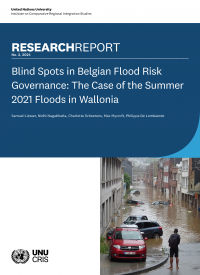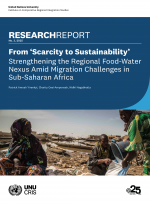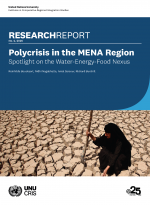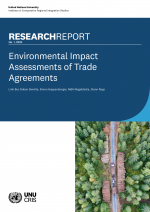Blind Spots in Belgian Flood Risk Governance: The Case of the Summer 2021 Floods in Wallonia

We present a strategic assessment of the gaps in Belgian flood risk governance following the 2021 summer floods in Western Europe. The catastrophic floods of July 2021 in Belgium’s Walloon Region underscored the critical need to comprehensively evaluate the country’s flood risk governance. Through qualitative discourse analysis and stakeholder engagement, our assessment identifies critical governance gaps that exacerbated the impact of the floods. Addressing these gaps is paramount to enhancing Belgium’s resilience to future extreme climate events and fostering a robust disaster risk governance framework.
The analysis highlights six primary areas of concern, referred to as ‘blind spots’, which require immediate attention and strategic action:
Complex Governance Arrangements: The intricate web of governance structures in Belgium complicates effective inter-sectoral and inter-agency coordination. The ambiguity surrounding roles, responsibilities, and decision-making authority hinders swift and efficient emergency responses. Strategic recommendations include streamlining governance frameworks to clarify authority lines and enhance coordination mechanisms across all government levels and relevant agencies.
Communication Issues: The current state of information exchange among stakeholders needs to be improved, particularly in emergency situations. This impedes effective risk mitigation and response efforts. To overcome this, it is essential to establish and maintain open, transparent, and real-time communication channels that facilitate the seamless flow of critical information before, during, and after disaster events.
Preparedness Challenges: A notable lack of proactive measures and comprehensive contingency planning leaves communities vulnerable. Strengthening preparedness requires developing and implementing robust, actionable plans that are regularly updated and tested through drills and simulations, ensuring readiness for future events.
Citizen Engagement Deficits: The limited involvement of communities in resilience-building efforts undermines the effectiveness of governance measures. Enhancing citizen engagement through participatory approaches and empowerment initiatives is crucial for building community resilience and ensuring that governance strategies are inclusive and representative of local needs and perspectives.
Return to Normalcy Obstacles: The recovery phase post-flood is fraught with challenges, notably in the ‘build back better’ agenda’s reliance on the insurance sector. Developing comprehensive recovery strategies that prioritize rapid restoration, adaptation, and resilience-building is essential. This includes revising insurance frameworks to support effective recovery and incentivize risk-reduction measures.
Risk Culture Gaps: The absence of a well-established risk culture amplifies vulnerabilities to climate-related disasters. Cultivating a strong ‘risk culture’ involves enhancing public awareness, understanding, and acceptance of risk management principles. This can be achieved through education, community engagement, and the integration of risk considerations into all levels of planning and decision-making.
In conclusion, addressing these identified gaps offers a pathway to strengthening Belgium’s disaster risk governance framework at national and sub-national levels, and holds potential for scaling at the regional level. We call for a cohesive, interdisciplinary approach that enhances communication, preparedness, community engagement, recovery strategies, and risk culture. By adopting adaptive and inclusive governance strategies, Belgium can protect its communities against the increasing threat of floods and other extreme climate events, ensuring a resilient and sustainable future.





